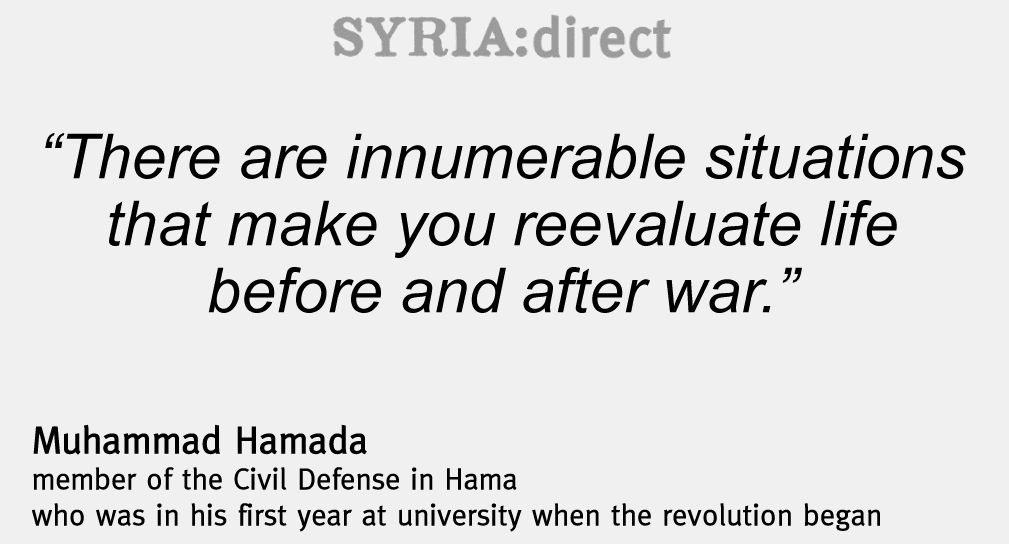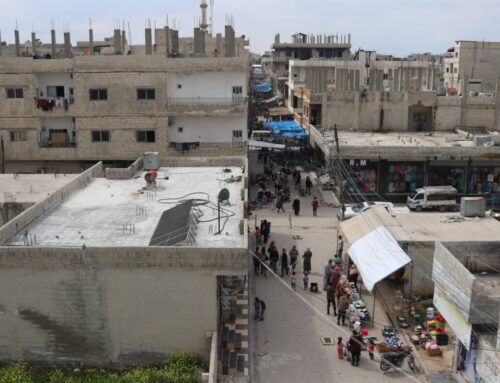Why young men are taking one of Syria’s most dangerous jobs
Civil Defense Units (CDUs) provide emergency response for victims of […]
24 March 2016
Civil Defense Units (CDUs) provide emergency response for victims of shelling, barrel bombs and other violence in rebel-held Syria.
While most people would run in the opposite direction after a bombing, CDUs rush in to extinguish fires, pull victims from underneath rubble and transport them to the nearest medical centers.
Here, two members of the Syrian Civil Defense, Sameer Abdallah of Aleppo and Muhammad Hamada of Hama, discuss why they do it. One reason, they tell Syria Direct’s Bahira al-Zarier, is that the Civil Defense’s mission is to save Syrian lives—all lives.
“The Civil Defense helps everyone,” says Hamada. “It doesn’t distinguish between different armed factions, militias or affiliations.”
**
Sameer Abdallah, a 29-year-old Civil Defense member from Aleppo is an IT engineer by trade but was a soldier in the army who defected in 2012.
Q: Could you tell us your name, age and where you’re from?
My name is Sameer Abdallah, from Aleppo. I’m 29 years old. I am an IT engineer by trade.
Q: Where were you employed before you joined the Civil Defense?
Before joining the Civil Defense I worked with an organization that provided aid to internally displaced Syrians. I also managed a wireless internet company. Before all of this I served in the Syrian army. But I defected in 2012 because of the crimes committed against the civilian population.
Q: Did you receive any training before you started working with the Civil Defense?
I didn’t have previous training in civil defense. When I first joined in 2014, the Civil Defense largely relied on individual efforts.
Q: Why did you join? Do you receive a salary for your work with them?
I really wanted to join the Civil Defense simply because of the role they play in rescuing people, regardless of the victim’s affiliation. I was also impressed by their devotion to humanitarian work. So all of this pushed me to help them in any way I could despite the constant danger that accompanies the work and the fact that at any moment they could lose their lives.
Currently I am managing another volunteer, an engineering student, and we archive the communication between different Civil Defense units. I also assist with technological needs within the office and provide general technological support. I’m eager to use my expertise to assist them.
As a manager of the local Civil Defense tech office, I receive $175. Despite the continued fighting and the deteriorating humanitarian situation, this salary has allowed me to get by over the past eight months.
Q: Could you describe, in detail, some of the scenarios you’ve experienced while serving with the Civil Defense?
Our teams have seriously suffered from a lack of communication, to the point that some of our colleagues have been killed because of it. For a while we were unable to tell our coworkers when planes were returning to a site [where they were working to rescue victims] in order to hit it again.
These heroes would rush to the site of an exploded barrel bomb to rescue victims as quickly as possible without thinking or waiting for the warplanes to leave. This is what kills most Civil Defense members—when a plane returns to bomb the same place.
Often their friends would observe the planes returning to where their colleagues were. They would call to them: “Get out, the plane is above you and wants to bomb again, get out.” But their colleagues didn’t have walkie-talkies to hear the warnings. Unfortunately this happened over and over again before we developed our communication system.
**
Muhammad Hamada, 24, a member of the Civil Defense in Hama who was in his first year at university majoring in mathematics when the revolution began.
Q: Why did you join the Civil Defense? Do you receive a salary for your work with them?
I joined the Civil Defense to serve my village. There wasn’t a particular reason that caused me to join. I simply wanted to take part in humanitarian work. Also, the Civil Defense helps everyone. It doesn’t distinguish between different armed factions, militias or affiliations.
My monthly salary is $150.
Q: Could you describe, in detail, some of the scenarios you’ve experienced while serving with the Civil Defense?
Working with the Civil Defense has completely changed how I think about life. I am happy to be able to rescue people and help renew their hope in life.
There are innumerable situations that make you reevaluate life before and after war. Once, in Sahel al-Ghab near al-Howsh, there was a barrel bomb attack. The observatory warned that the helicopter was going to bomb and a family rushed into an underground bomb shelter. When the bomb fell to the ground, it leveled the entire neighborhood. The shelter collapsed on top of the family.
My colleagues in the Civil Defense and I rushed in to help victims. We spent an hour and a half trying to get to the shelter door. We pulled four bodies from the rubble: a mother, a father, and two children, aged four and six. After pulling the bodies from the rubble, we continued searching until we found an eight-year-old girl. As we put her in the ambulance she looked at us and began crying and saying, “I want my mommy.” I felt so sorry for this child who will never forget how she lost her father and mother. To this day I still think about that moment.
When I first began this work, I was terrified. But as I began to see what was happening to my village, the utter destruction and the death, I started to welcome death. My goal and that of my colleagues is to offer what we can and to help people. Death doesn’t discriminate between anyone.







